Studies on the Chinese Economy During the Mao Era
ebook ∣ Studies in Economic History
By Katsuji Nakagane

Sign up to save your library
With an OverDrive account, you can save your favorite libraries for at-a-glance information about availability. Find out more about OverDrive accounts.
Find this title in Libby, the library reading app by OverDrive.



Search for a digital library with this title
Title found at these libraries:
| Library Name | Distance |
|---|---|
| Loading... |
This book focuses on several specific features characterizing China's economy in the Mao era (1952–1976), and discusses whether and how they are related to the new economic strategy called "reforms and opening-up" under Deng Xiaoping's leadership with the result of the aftermath of well-known rapid growth.
It provides the reader with basic knowledge of the continuity and discontinuity between the Mao and Deng eras. Readers are provided with some important clues for thinking about how Maoist China could have contributed to or alternatively prevented today's economic development. The topics addressed here include a brief overview of economic development under Mao, significant differences between Mao and Deng economics, and socialist transformations during the early Mao era. These include collectivization as well as communization and the effects on agricultural productivity; water supply construction drives utilizing a vast amount of rural surplus labor; rural finance; the effects on national savings, and the development of heavy and light industry. Also considered are the effects on the socialist industrialization, rural small-scale industries during the Cultural Revolution and their aftermath, and the realities of social life in a Third-front construction site promoted by Mao's military strategy in the 1960s. This book is highly recommended to readers who are interested in contemporary China's economy, particularly to scholars and students. The volume gives new insight into the background or preconditions that made possible historically rare miracles of the Chinese economy after Mao.







